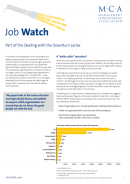MCA Job Watch report warns businesses not to lose their best people, but finds almost two thirds are doing little or nothing to keep them…
A Management Consultancies Association (MCA) Job Watch report, released today (17th December 2008), warns that UK businesses need to manage their redundancy programmes carefully as they run the risk of losing good people as well as bad. This risk is magnified as a high proportion of current and expected cuts are falling on managers who, as a group, are critical in helping organisations survive the downturn. The MCA estimates that if unemployment reaches three million, at least a further 360,000 managers could go by 2010.
The MCA says that with such a large number of middle and senior management positions under threat, it is important for businesses to have systems in place to identify poor-performers and retain their best people. However, the research report also found that whilst businesses are aware that losing their best people will make things harder, two thirds (60 per cent) are doing little or nothing to keep them.
The Job Watch report, part of the MCA’s Dealing with the Downturn series, says that today’s unemployment figures will look mild in retrospect as business optimism remains rock bottom. The MCA survey, based on consultants who work with 90 of the FTSE100 found that:
- The majority of businesses (82 per cent) are not well positioned to withstand the downturn
- Profits are expected to fall in over four out of five companies
- Two thirds of organisations are expected to make substantial lay-offs in the next 12 months
Alan Leaman, Chief Executive of the MCA, said:
“If businesses choose to make sweeping job cuts and unemployment rises as high as three million, at least 360,000 management positions could go. At these challenging times, redundancy and restructuring programmes can leave businesses more efficient, more focused and better prepared for the recovery. However, businesses need to ensure they don’t lose their best people as this could seriously damage their ability to compete.
Recovery, once it comes, will also be slower and more painful if your best people have left and need to be replaced.”
Chris Watkin, Director, Leadership and Talent, Hay Group, agrees:
“You have to hang on to your talented people, because this is all you have to fight back with.”
Drawing on the experience of HR consultants, the MCA Job Watch report identifies six key steps businesses need to take in order to retain their best people during the coming months.
- Be ready: only fools rush in – A recent MCA report on talent management found that only half of businesses know who their best people are, and only a third have a process for developing and retaining this group. As redundancy programmes are typically put together in a rush, businesses need to know who their high performers are before this point is reached.
- Understanding employees’ motivations – Sensible organisations should cut their training back selectively. Bonuses will need to be scaled back but not cut completely. The real danger lies in assuming that all high-performers are motivated by the same things. Russell Hobby, Associate Director, Hay Group says: “You need a diverse approach. The trend to classify people – Generation Y, for example – is just sloppy thinking.”
- Demonstrate leadership – Retention of leadership is key. Scott McArthur, Principal Consultant, Atos Consulting says: “People join an organisation because of its reputation, but they leave because they don’t like their boss.” This problem is magnified during a downturn when it is not untypical for leadership to evaporate.
- Be honest – Economic uncertainty creates a vacuum which is inevitably filled by rumours. Managers often think their role is to sweep understandable fears under the corporate carpet, maintaining a show of optimism at all costs. The irony is that openness is a far more effective way to maintain morale.
- Consult where possible – Managers need to involve employees in business decision-making. A classic failing during a recession is for management to limit discussion to a small circle and avoid listening to a range of advice.
- Limit the damage – Widespread redundancies can cause havoc, not only for the lives of those who lose their jobs, but also those left behind. Repairing reputational damage takes time, but businesses can help themselves by talking to customers to understand their needs and concerns, redeploying people who are less busy onto projects that have the potential to create value, and showing that you are able to live up to your values, even in a downturn.
For a copy of the MCA Job Watch report please contact Stephanie Henderson at stephanie.henderson@mca.org.uk or tel: 020 7321 3993.
-ENDS-
3.
For more information, please contact:
David Pippett
Director
DWP Public Relations
Tel: 01225 833745 / Mobile: 07899 798197
Email: david@dwppublicrelations.co.uk
Stephanie Henderson
Head of Communications
Management Consultancies Association
Tel: 020 7321 3993
Email: stephanie.henderson@mca.org.uk
About the Management Consultancies Association
The MCA was formed in 1956 to represent the consultancy industry to its clients, the media and government. Management consultancy is an increasingly important industry for the UK economy with management consultancy revenues for 2007 estimated at around £8bn. MCA members represent around 70% of the UK consulting sector, employ around 30,000 consultants and work with most of the FTSE100 and all government departments. Eight of the top ten UK-based consulting firms (by consulting fee income) are members.
The MCA supports its member firms with a range of services including events, publications, interest groups and public relations. The Association also works with its members to attract the top talent into the industry. The MCA provides advice on the selection and use of management consultants and is the main source of data on the UK market.

